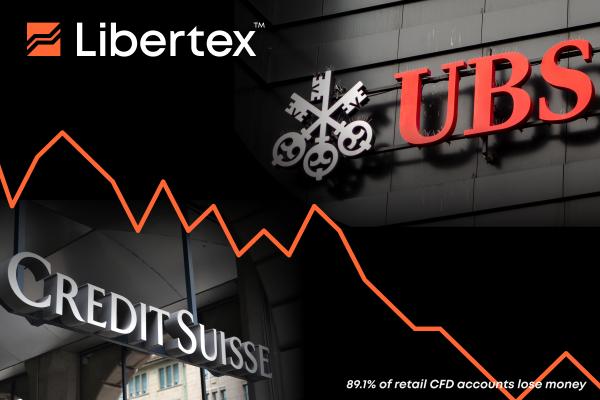In a matter of days since the collapse of Silicon Valley Bank and Signature Bank, yet another behemoth of corporate finance has had to be pulled from the jaws of bankruptcy in what has been dubbed a “shotgun wedding” takeover. Long-maligned Credit Suisse has finally bitten the bullet, with UBS forced to absorb the ailing business bank and its $5 trillion of invested assets. Optimistic analysts are claiming that this finally draws a line under the questions about Credit Suisse’s viability, while their more pessimistic colleagues are pointing to potential signs of contagion much like during the 2008 GFC that could spell catastrophe for the world’s already precarious financial markets. So, who’s right and what does this mean for traders and investors in the short term?
Devil’s in the detail
The collapse of SVB and Signature was by no means a drop in the ocean – they now rank in second and third spot respectively in the US’s biggest bank failures of all time. However, their highly speculative activity predicated on the unsustainably high stock prices of 2020-2021 made them especially vulnerable during this extended bear market. Credit Suisse is a completely different animal altogether. This is a Swiss national institution with a history dating back to 1856 and a much broader spectrum of activity than its US counterparts. With major investors including the Saudi National Bank and Qatari Investment Authority, Credit Suisse is a major global player with influence on a wide variety of asset classes and businesses. For this reason, its failure would have far-reaching effects on world markets, which is most likely why it wasn’t allowed to go the same way as SVP and Signature.
A long time coming
It might have come as a shock to hear that a bank with a 167-year history has gone under, but this failure has been building for some time now. Over the past two years, Credit Suisse’s stock price had fallen 84%, while its new owner UBS had managed to cement 15% gains over this same period. Last year, Credit Suisse posted a loss of over $7 billion, and just a week before the eventual $3 billion takeover, it was valued at just $8 billion. Indeed, amid mass depositor panic that saw tens of billions of dollars being withdrawn each day, the Swiss government provided the bank with a bridge loan of $54 billion – all of which has now been spent. In fact, so dire is the situation that the Swiss National Bank has even agreed to provide a further $108 billion in funding to UBS in order to boost Credit Suisse’s liquidity over the long term. As a result of this entire debacle, even UBS’s share price has taken a hit of more than 10% over the last week alone.
Why worry?
There are many who would say that these are just three overleveraged banks whose chickens have come home to roost and there’s no sign of wider contagion like in 2008. And while that would certainly be true enough for SVB and Signature, Credit Suisse is a totally different matter. Its own shareholders have already lost over 50% of their investment following the post-takeover share swap, while the bank’s AT1 bondholders have been left with nothing. It has been made clear that the bank is still far from out of the woods and, with over $5 trillion in invested assets, a future collapse would be absolutely disastrous for markets everywhere. This loss of principle by the AT1 bondholders has already provoked a rout on the European convertible bonds markets, which could lead to further trouble for the banking sector at large. Analysts are also predicting a general dip in demand for risk assets until confidence returns. Nothing is certain just now…and that’s part of the problem. But if another major bank falls into trouble, then it could well be time to panic and consider increasing one’s gold allocation.
Trade any trend with Libertex
As one of Europe’s leading CFD brokerages, Libertex provides competitive terms on a wide range of instruments and asset classes. Beyond CFDs in individual stocks like Deutsche Bank, Goldman Sachs, and Citigroup, and a range of indices and ETFs, such as the S&P 500, DAX, and EURO STOXX 50. We also provide CFDs in gold and silver. For more information or to create your own account, visit https://libertex.com/signup
Risk Warning: CFDs are complex instruments and come with a high risk of losing money rapidly due to leverage. 89.1% of retail investor accounts lose money when trading CFDs with this provider. Tight spreads apply. Please check our spreads on the platform. You should consider whether you understand how CFDs work and whether you can afford to take the high risk of losing your money.


